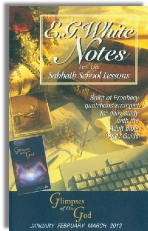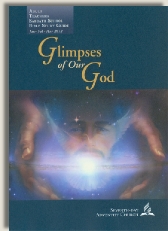|
||||||||||||||
Commentary on "God the Lawgiver"
Day 2: Sunday, February 5, 2012 - The Law at Sinai
In today’s lesson, the author tries to establish that the people of Israel were overwhelmed by their sinfulness when the law was given. The writer gives an Ellen White quote in support.
A few pointers when reading the Sabbath School lesson. Look up every single text and read the 10-or-so verses before and after in order to get a grasp of the context (better yet, read the whole chapter!) In the first verses provided, Exodus 19:18,19, you will note that the people trembled (vs. 16) because of the sound of the ram’s horn. The awesome sights, sounds and sensations they experienced (thunder, lightening, smoke, ground shaking violently) were because of the Lord’s presence, not because of their recognition of their sinfulness in light of the law. In fact, the law had not even been given yet (see Exodus 20).
The next verse listed, Exodus 20:18 also shows the people trembling at the thunder, ram’s horn blast, flashes of lightening and smoke billowing from the mountain after God spoke the 10 commandments directly to them. If you keep reading the subsequent chapters, you will note that at the people’s request, God continued to give the law, but now through Moses.
18 When the people heard the thunder and the loud blast of the ram’s horn, and when they saw the flashes of lightning and the smoke billowing from the mountain, they stood at a distance, trembling with fear.
19 And they said to Moses, “You speak to us, and we will listen. But don’t let God speak directly to us, or we will die!”
20 “Don’t be afraid,” Moses answered them, “for God has come in this way to test you, and so that your fear of him will keep you from sinning!”
21 As the people stood in the distance, Moses approached the dark cloud where God was.
The people’s response to the law was never what the author of the SS lesson or Ellen White says it was. There is no indication that the people were overwhelmed by their guilt in light of the law. In fact, in Exodus 24:4-7, after God has given all of His instructions to Moses, Moses writes them down in the Book of the Covenant and reads them aloud to the people. They respond, not by “trembling before the law” (as the lesson states) or by feeling or expressing their need for a Savior, instead the say, “We will do everything the Lord has commanded. We will obey” (vs. 7).
Again, the law here is defined narrowly as the Ten Commandments, though there is no biblical justification for doing so. The 10 commandments are the terms of the Covenant (Exodus 25:16) given to Israel on Mount Sinai , but they are not the whole law that was given to the nation. There are 603 other commands (making 613 total) that are part of the Torah (see here for a detailed list with Scripture references: http://www.jewfaq.org/613.htm).
The Deuteronomy 5:22 reference again states that the people trembled because of their encounter with God. If you keep reading to the end of the chapter, it becomes clear that God’s law-giving did not end with the 10 commandments. After God agrees not to speak to them directly and is pleased by their fear of Him, He tells Moses (vs. 30-31), “Go and tell them, 'Return to your tents’. But you stand here with me so I can give you ALL my commands, decrees and regulations. You must teach them to the people so they can obey them in the land I am giving them as their possession.”
The misuse of Hebrews 12:21 in the lesson is the most heartbreaking of all. By narrowly focusing on the fact that Moses too was frightened at the sights and sounds at the foot of the mountain (v. 21) the author tragically misses the beautiful context of in which the verse is found. Verse 18 tells New Covenant believers (those who have accepted Jesus’ righteousness) are NOT at the foot of Mount Sinai trembling. Here’s what it says (emphasis mine):
18 You have not come to a physical mountain, to a place of flaming fire, darkness, gloom, and whirlwind, as the Israelites did at Mount Sinai. 19 For they heard an awesome trumpet blast and a voice so terrible that they begged God to stop speaking. 20 They staggered back under God’s command: “If even an animal touches the mountain, it must be stoned to death.” 21 Moses himself was so frightened at the sight that he said, “I am terrified and trembling.”
22 No, you have come to Mount Zion, to the city of the living God, the heavenly Jerusalem, and to countless thousands of angels in a joyful gathering. 23 You have come to the assembly of God’s firstborn children, whose names are written in heaven. You have come to God himself, who is the judge over all things. You have come to the spirits of the righteous ones in heaven who have now been made perfect. 24 You have come to Jesus, the one who mediates the new covenant between God and people, and to the sprinkled blood, which speaks of forgiveness instead of crying out for vengeance like the blood of Abel.
25 Be careful that you do not refuse to listen to the One who is speaking. For if the people of Israel did not escape when they refused to listen to Moses, the earthly messenger, we will certainly not escape if we reject the One who speaks to us from heaven! 26 When God spoke from Mount Sinai his voice shook the earth, but now he makes another promise: “Once again I will shake not only the earth but the heavens also.”27 This means that all of creation will be shaken and removed, so that only unshakable things will remain.
28 Since we are receiving a Kingdom that is unshakable, let us be thankful and please God by worshiping him with holy fear and awe. 29 For our God is a devouring fire.
It is impossible to understand the law, including the 10 commandments, outside of the Covenants. The law was the covenant agreement that God made with Israel (Exodus 19 and 20) in order to establish them as a nation and set them apart as His special people (Deuteronomy 26:16-19). The writer correctly states that “the law was never meant to be a means of salvation, even at Sinai.” Nevertheless, the lesson fails to place the law in its proper context and fully explore what the law was and why it was given. (For more on the law, 10 commandments and Covenants, check here, here and here.)
When discussing the purpose of the law, the author makes a statement that is half-true, half-untrue. “The problem is not with God’s law; the problem is with sinners who have violated the law, as we all have done.” But the texts used (Romans 7:8-13) reveal that the problem is (yes) not with God’s law, but with SIN itself. Notice what it says (emphasis supplied):
8 But sin used this command to arouse all kinds of covetous desires within me! If there were no law, sin would not have that power. 9 At one time I lived without understanding the law. But when I learned the command not to covet, for instance, the power of sin came to life, 10 and I died. So I discovered that the law’s commands, which were supposed to bring life, brought spiritual death instead. 11 Sin took advantage of those commands and deceived me; it used the commands to kill me. 12 But still, the law itself is holy, and its commands are holy and right and good.
13 But how can that be? Did the law, which is good, cause my death? Of course not! Sin used what was good to bring about my condemnation to death. So we can see how terrible sin really is. It uses God’s good commands for its own evil purposes.”
Clearly, the issue is sin, not the sinner.
Finally, the lesson concludes with the truth that the purpose of the law is to reveal sin. This is reiterated in Romans 3:19-20 and Galatians 3:22-24.
“Obviously, the law applies to those to whom it was given, for its purpose is to keep people from having excuses, and to show that the entire world is guilty before God. For no one can ever be made right with God by doing what the law commands. The law simply shows us how sinful we are.”
Galatians 3:22-24:
“But the Scriptures declare that we are all prisoners of sin, so we receive God’s promise of freedom only by believing in Jesus Christ. Before the way of faith in Christ was available to us, we were placed under guard by the law. We were kept in protective custody, so to speak, until the way of faith was revealed. Let me put it another way. The law was our guardian until Christ came; it protected us until we could be made right with God through faith. And now that the way of faith has come, we no longer need the law as our guardian.”
1 Timothy 1:8-11explains who the law is for.
“We know that the law is good when used correctly. 9 For the law was not intended for people who do what is right. It is for people who are lawless and rebellious, who are ungodly and sinful, who consider nothing sacred and defile what is holy, who kill their father or mother or commit other murders. 10 The law is for people who are sexually immoral, or who practice homosexuality, or are slave traders, liars, promise breakers, or who do anything else that contradicts the wholesome teaching 11 that comes from the glorious Good News entrusted to me by our blessed God.”
And Galatians 5:18 explains that the law is for those who are not under the influence of the Holy Spirit. So, in essence, the law is not for people who have been saved and redeemed by the blood of Jesus.
Questions to consider.
Sunday’s lesson ends by asking the reader the following questions:
- Do you find yourself trembling before the law?
- Do you find yourself convicted by it?
- What are your emotions as you read the law and compare yourself with it?
How would someone who is secure in the complete covering of Jesus’ blood over ALL of their sins —past, present, future —answer the question listed at the end? In other words, if you were to believe that you are considered righteous before a Holy God, because of what Jesus has done, then how do you answer these questions differently from an unbeliever?
Copyright 2012 BibleStudiesForAdventists.com. All rights reserved. Revised February 2, 2012. This website is published by Life Assurance Ministries, Glendale, Arizona, USA, the publisher of Proclamation! Magazine. Contact email: BibleStudiesForAdventists@gmail.com.
The Sabbath School Bible Study Guide and the corresponding E.G. White Notes are published by Pacific Press Publishing Association, which is owned and operated by the Seventh-day Adventist church. The current quarter's editions are pictured above.
Official Adventist Resources
Standard Edition Study Guide Week 6
Teacher's Edition Study Guide Week 6
Easy Reading Edition Study Guide Wk 6
Search the Complete Published Ellen G. White Writings
Please Support This Project


